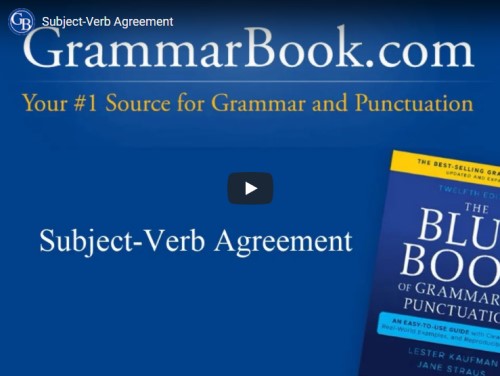|
Having trouble viewing this message? Click here to view it online.
To unsubscribe or change contact details, scroll to the bottom and follow the link.
|



|
|
Tackling More Tricky Word Choices: Issue vs. Problem
|
|
Several of our articles have focused on tricky word choices, ones that may throw us off simply because we might not be aware of or pay attention to their subtleties and differences.
Another pair of tricky, freely swapped words is issue and problem. Most often, we’ll use issue to mean problem, not realizing its main definition intends to convey something else. Let’s take a closer look at these words.
The primary meaning of issue is “a point or matter of discussion, debate, or dispute between two or more parties.” Other relevant definitions include “a matter of public concern” and “a misgiving, objection, or complaint.”
Problem, on the other hand, communicates “a question raised for inquiry, consideration, or solution,” “an intricate unsettled question,” “a source of perplexity, distress, or vexation,” and “difficulty in understanding or accepting.”
Some dictionaries have helped blur the distinction by allowing the concept of problem to trickle into definitions of issue. Within dictionary entries, appearances of problem under meanings of issue range from near the top to much farther down.
For example, the online American Heritage Dictionary introduces problem in its second definition of issue, immediately following the first and more weighted one. Conversely, the online Oxford English Dictionary does not mention problem as related with issue until the sixteenth definition. Merriam-Webster alludes to problem in definition six. Dictionary.com does not introduce the idea of problem at all.
So what, then, do careful writers do when common usage and even dictionaries muddy our mission for precision? We recommend an even greater focus on using issue and problem as we’ve distinguished them here. This will help reinforce the exactness English offers us.
We acknowledge that issue and problem will still be exchanged in spoken communication. At the same time, now that we better understand the difference, we can lead more-accurate usage by keeping their intended primary meanings within our own speech.
|
View and comment on this
article on our website.
|
|
|

|
Pop Quiz
Choose either issue or problem as it fits by its main definition in each sentence.
1. I think we have a serious (issue / problem) with the balance sheet. The numbers are way off.
2. Do you think he has (an issue / a problem) with his focus during meetings?
3. The main (issue / problem) here is whether we should allow the empty twenty acres west of Route 45 to be rezoned for commercial use.
4. The council will soon discuss the (issue / problem) of a proposed hike in water rates.
|
 |
The Blue Book of Grammar and Punctuation
by Lester Kaufman and Jane Straus |
The Authority on English Grammar! Twelfth Edition Now Available
An indispensable tool for busy professionals, teachers, students, homeschool families, editors, writers, and proofreaders.
Available in print AND as an e-Book! Over 2,000 copies are purchased every month!
To order the book, simply click the link to order the book from the GrammarBook.com website.
|
Free BONUS Quiz for You!
Friend, because you are a subscriber to the newsletter, you get access to one of the Subscribers-Only Quizzes. Click here to take a Confusing Words and Homonyms Quiz and get your scores and explanations instantly!
We will be adding many more quizzes this year to our already substantial list of them. If you have suggestions for topics we have not yet covered, please send us a message at help@grammarbook.com.
|
Hundreds of Additional Quizzes
at Your Fingertips
Subscribe now to receive hundreds of additional English usage quizzes not found anywhere else!
Teachers and Employers
Save hours of valuable time! You may assign quizzes to your students and employees and have their scores tallied, organized, and reported to you! Let GrammarBook.com take the hassle out of teaching English!
"Fun to test my skills."
"The explanations really help ... thanks!"
"I can select the quizzes to assign to my students, and then the results are reported to me automatically!"
If you think you have found an error in a quiz, please email us at help@grammarbook.com
|
Wordplay
Fun for our lexophiles:
• Jokes about German sausage are the wurst.
• I know a guy who's addicted to brake fluid, but he says he can stop any time.
• I stayed up all night to see where the sun went, then it dawned on me.
• When chemists die, they barium.
• I'm reading a book about anti-gravity. I just can't put it down.
Pop Quiz Answers
1. I think we have a serious (issue / problem) with the balance sheet. The numbers are way off.
2. Do you think he has (an issue / a problem) with his focus during meetings?
3. The main (issue / problem) here is whether we should allow the empty twenty acres west of Route 45 to be rezoned for commercial use.
4. The council will soon discuss the (issue / problem) of a proposed hike in water rates.
|
 |
English In A Snap:
68 One-Minute English Usage Videos FREE |
Learn all about who and whom, affect and effect, subjects and verbs, adjectives and adverbs, commas, semicolons, quotation marks, and much more by just sitting back and enjoying these easy-to-follow lessons. Share them with your colleagues (and boss), children, teachers, and friends as well! Click here to watch.
|
|